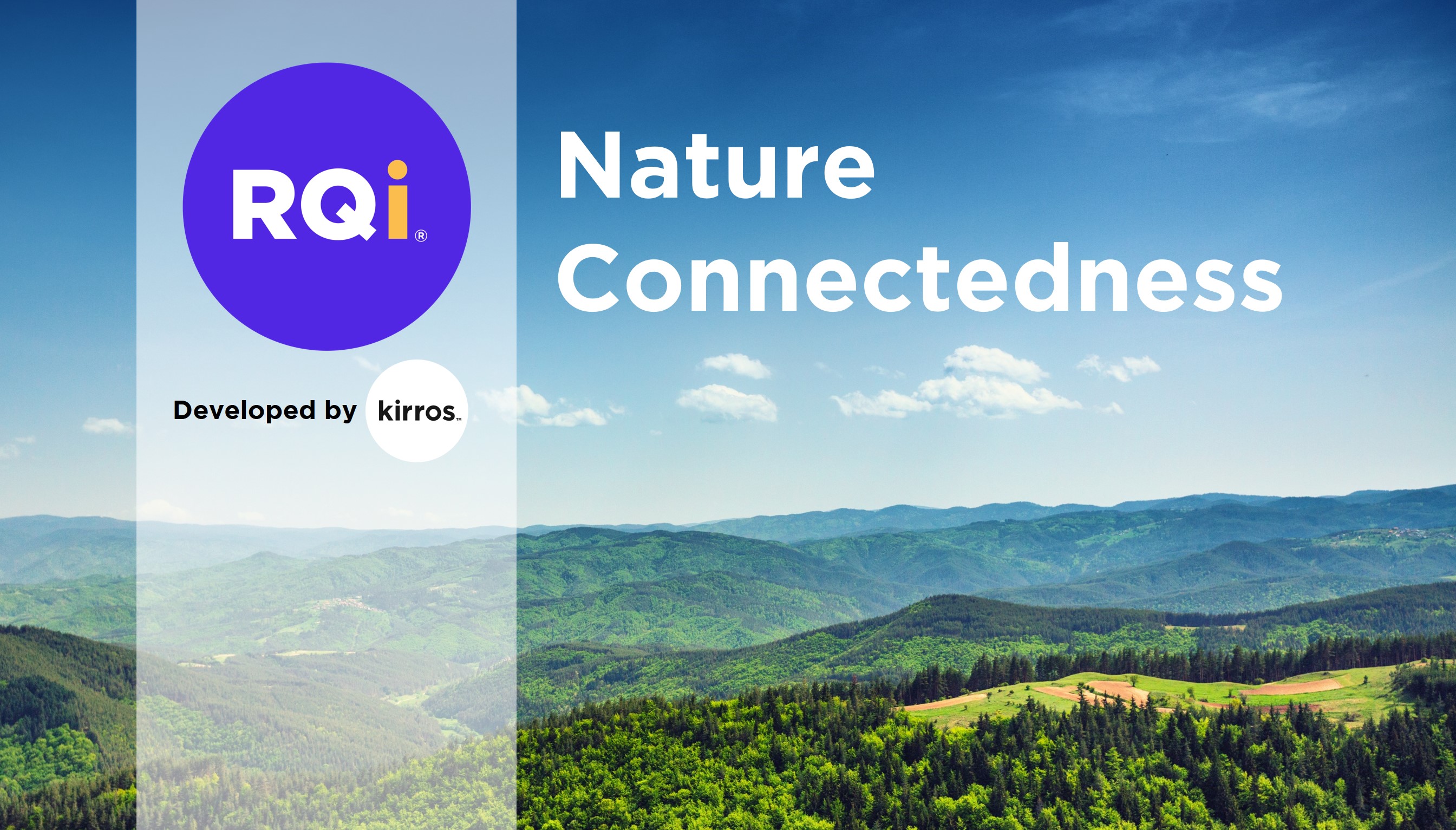- 29 July 2023
As part of our ongoing commitment to research and development, Kirros has initiated work on a new RQi™ sub-scale: Nature Connectedness. Testing of items starts in August 2023.
What is nature connectedness?
The concept of nature connectedness (NC) or nature relatedness (NR) is "a measurable psychological construct that moves beyond contact with nature to an individual’s sense of their relationship with the natural world”*. It has it's origins in the biophilia hypothesis (Wilson, 1984) which posits that humans have an innate desire for connection to the natural world. NC also links to the phenomenon of awe, which is when people experience a sense of joy, freedom, vastness, connectedness and respect for nature, when immersed in beautiful natural landscapes.
Nature connectedness and wellbeing
It is already well established that exposure to nature has a positive impact on mood and wellbeing (WHO Review, 2016). This may be driven in part by NC, as NC is also positively correlated with wellbeing and in some studies, it mediates the positive impact of nature on wellbeing (see Howell et al., 2011). Therefore, an increase in nature connectedness may amplify the positive benefits of nature on mood and wellbeing. There is also evidence that people with a strong sense of nature connectedness are more likely to make environmentally conscious purchasing decisions. So it links to the bigger issue of climate change and the need for people to make lifestyle changes to help meet net zero targets.
What are the components of nature connectedness?
Nisbet and colleagues (2009) have described three sub-elements of Nature Connectedness. These are described below along with example questions from psychometric scales.
1. Self
The sense that nature is part of one's identity, e.g., “My relationship to nature is an important part of who I am” and also a sense of connection to the natural world ("I feel very connected to all living things and the earth.")
2. Perception
The attitudes people hold towards the natural world including environmental protection and education, e.g. “Humans have the right to use natural resources any way we want” (which is reverse-scored in psychometric ).
3. Experience
The preferences people have for spending time in nature, including being mindful in nature and experiencing positive emotions, e.g., “I take notice of wildlife wherever I am” and "I enjoy being outdoors, even in unpleasant weather."
A new scale for the RQi™
Kirros will soon start testing items in the live RQi™ questionnaire to create a Nature Connectedness scale in August. Based on a full review of the literature, we will test items that relate to the NR Self subscale (with a focus on the belonging and connectedness rather than identity) and the NR Experience sub-scale and the Environmental Identity Scale (EID).
Once we have sufficient sample size, we will repeat our factor analysis to see where the scale fits alongside existing RQi™ sub-scales and how to correlates with outcomes. Our hypothesis is that the Nature Connectedness scale fits into the Managing Physiology element and will correlate positively with subjective wellbeing and negatively with stress.
Watch this space!
References
- Howell et al. (2011). Nature connectedness: Associations with well-being and mindfulness. Personality and Individual Differences 51; 166–171
- Nisbet, E.K., Zelenski, J.M., and Murphy, S.A. (2009). Linking Individuals’ Connection With Nature to Environmental Concern and Behavior. Environment and Behavior; 41 [5]; 715-740.
- Wilson, E. O. (1984). Biophilia. Cambridge: Harvard University press.
- World Health Organization (WHO). (2016). Urban green spaces and health. Copenhagen: WHO Regional Office for Europe.
*Nature Connectedness Research Group, University of Derby. Retrieved from: https://www.derby.ac.uk/research/centres-groups/nature-connectedness-research-group
A new 'joined-up' way to tackle stress and boost resilience in the workplace
Download our report to uncover a new approach to tackling stress and enhancing resilience and wellbeing in the workplace.

